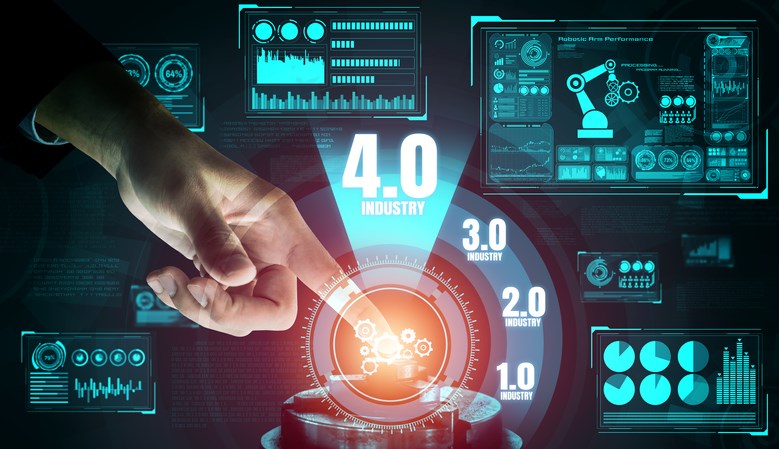
Few concepts have captured the attention of the manufacturing world like that of Industry 4.0. At its core, Industry 4.0 is the most recent iteration of an industrial revolution. Centered around automation, connectivity, and data, it’s a phase that has brought about profound changes in the way manufacturers operate and interact with their craft and their customers. These shifts have led many to wonder, “What does Industry 4.0 mean to the supply chain?”
From diversifying sourcing to nearshoring, there’s no question that the supply chain has undergone a drastic transformation in the last several years. Part of that change is thanks to Covid, but Industry 4.0 has had an equal and more permanent impact that will likely change the supply chain as we know it for good. So, exactly what does Industry 4.0 mean to the supply chain? Let’s take a closer look.
What Industry 4.0 Is. And What It Isn’t.
First, it’s important to acknowledge that, like most things with an air of novelty, the term “Industry 4.0” has gotten a lot of buzz recently. Most businesses in the manufacturing industry (and many businesses outside of it) have mentioned Industry 4.0 somewhere, whether on their website, in their emails, or on social media. But few take the time to actually define it.
As mentioned above, Industry 4.0 is also known as the 4th industrial revolution. Most people are familiar with the periods in history that make up the other three. The first, in the 18th century, was characterized by steam power, the second in the 19th century by electricity and assembly lines, and the third in the 1970s with the rise of the first computers.
By the same token, Industry 4.0 is marked by a drastic leap in technology. In this case, autonomous systems, smart tech, machine learning, and data-guided methods.
What Industry 4.0 is not is a singular concept or piece of technology that can be incorporated into a manufacturer’s methods or supply chain. Rather, it is a holistic method that brings together various factors to create a connected and intelligent ecosystem. In the context of the supply chain, this is a recipe for radical and sometimes overwhelming change.
What Does Industry Mean to the Supply Chain?
Applying Industry 4.0 to the supply chain requires taking a closer look at some of the specific impacts. While not comprehensive, the following list gives a solid breakdown of some of the most important changes:
Improved Visibility and Real-Time Tracking with IoT— IoT, or the Internet of Things, is the interconnection between devices, products, and vehicles, enabling real-time data exchange that enhances visibility across the supply chain. In turn, this ensures transparency and minimizes disruptions by giving businesses the confidence that they’ll receive their parts and products when they need them.
Enhanced Demand Forecasting and Inventory Management — AI-driven algorithms analyze vast amounts of data that businesses can use to make informed decisions. Demand forecasting and inventory management in particular have seen great improvements, alongside risk management and strategic planning.
Deeper Insights for More Proactive Decisions — Thanks to Big Data, supply chain managers can gain deeper insights into customer behavior, market trends, and operational efficiency. This allows businesses to improve production and distribution in order to reduce lead times and minimize delays.
Supply Chain Sustainability — Capabilities like automated route optimization reduce shipping costs and lower the environmental impact of the supply chain. Industry 4.0 tools also enhance the traceability of raw source materials and products for higher levels of transparency.
Looking Ahead: What Does Industry 4.0 Mean to the Supply Chain?
Historically speaking, industrial revolutions last anywhere from 50 to nearly 100 years. That means we’ve barely begun to see the long-term effects of this fourth advancement.
It’s difficult to say exactly what the future will look like, but in general, we expect to see major improvements in the reduction of waste thanks, at least in part, to predictive analytics. With the assistance of Big Data, manufacturers can optimize production processes and reduce excess levels of inventory.
There are also promising possibilities in the realm of connectivity. It’s likely that the supply chain in the near future will be defined by a state of hyper-connectivity in which every element communicates seamlessly for an ecosystem that is more efficient, responsive, and adaptable.
Experience Industry 4.0 Manufacturing with Thogus
At Thogus, we’re an injection molding contract manufacturer with a passion for staying at the forefront of advancements in manufacturing and technology. We believe that the more we improve our own processes, the more we can offer our customers.
We specialize in mid- to high-volume injection molding for a wide range of industries, backed by best-in-class machinery, robotics, and good old-fashioned white glove customer service.
Are you looking to experience all the benefits of Industry 4.0 injection molding with a partner that maintains the human connection? Get in touch with our team today and let’s talk about your needs.
Experience the Thogus Difference
Connect with us today to discuss your project and to learn more about our capabilities.